Transcription
No Good Deed...
Wednesday September 4, 2013
I've been working in the prison library for about 6-months now. As far as jobs behind bars are concerned, this one isn't half-bad. I'm surrounded by a wealth of knowledge that's immediately accessible, I get along with all of the guys I work with and even though my boss is far from perfect, he's one of the best bosses I've ever worked for, in prison or out. About the only thing I didn't like was the hours and the pay. With only 5 hours a day, 5 days a week (if we're lucky) and a paycheck of only $0.12 an hour, I was never going to be able to make any sort of dent in the size of my $30,000 court fine, no matter how hard I worked. Rather than complaining about it though, I chose to make the best out of a bad situation. Within less than a month, I found myself promoted 3 times, until I was working as my boss' personal assistant.
As his personal assistant, my duties included everything from keeping track of the incoming inventory, the requests for legal assistance made by those using the law library, the number and type of books checked out on a quarterly basis, how much money was spent or lost during any quarter, the amount of time each individual accessed the law library, and so much more. To do this, I had my own desk and a computer containing a total of 3 programs: Excel, Powerpoint and Word. None of these programs had been disabled in any way, but nothing else had been installed, I couldn't even access simple things, like the control panel, the folder options or even right-click on the desktop. Still, it was better than nothing, and again, I set out to make the best of a bad situation.
Prior to my arrest, I'd taught myself how to design my own e-commerce websites using programs like Word, Frontpage and Dreamweaver. While I was a far cry from the best, this gave me a better than average proficiency when it came to my fellow convicts and working on the computer. Still, there were a lot of programs I'd never bothered taking the time to use, mainly because they weren't something I'd ever needed to design my sites. For example, as a sole proprietor, I never had the need, let alone the desire, to use Powerpoint, and while Excel is an excellent program, it just wasn't something I ever found the need to use for any site I'd ever created. However, despite my lack of knowledge about either of these programs, not only did I already possess a better than average working knowledge of computers and their software, I also have an excellent ability for being able to learn new things, a talent which I quickly put to work. It wasn't long before I'd figured out how to use Excel to automate many of the tasks that had been performed manually by the previous clerk.
For example, one of the things I have to do is log in each book, magazine, newspaper and audio tape that comes into the library, along with how the library acquired it, i.e., donations from an inmate, purchase from the library, etc. If it's an inmate, his last name is logged into a column, followed in another column by his first name and his CDCR# in yet another column, after which several additional columns are used, one for the book's author, the title of the book, the category (fiction/nonfiction), and finally, the date the book was donated. There are a total of 6 worksheets in this Excel workbook, one for keeping track of the books, one for the magazines, newspapers and audio tapes, respectively. The first sheet is a "Master" sheet, detailing the total number of items donated by each particular individual or entity, and the second one is a sheet used to generate thank you notes to each.
The previous clerk would manually count everything that had been donated, which meant that his figures were often either incorrect, or people had failed to be mentioned. He was unaware that Excel is capable of performing a number of different mathematical calculations and other functions, something I didn't know either, but something which I was determined to learn. For the next 2 months, I alternated between performing my work and trying to learn how to get the most out of Excel, and before long, I'd figured out how to automate many of my tasks. Because of this, all I had to do know was insert the personal information of the person donating the item, along with the name and author of the item, and Excel would automatically add everything together, using that information to generate a thank you letter to the person making the donation. It wasn't a difficult task to accomplish. The hardest thing about it was finding the various formulas I needed in a library that had few books on the subject.
As I'm doing all of this, we lost both the convict helping the developmentally disabled prisoners (the DDP Clerk) and the Library Technical Assistant (LTA). He was transferred to another facility, she quit because the job had proven to be much different than she'd expected. Because of this, my employer asked me if I'd be willing to assist those convicts classified as developmentally disabled.
Providing this sort of assistance is more difficult than it would first appear. Without exception, every person classified as a Developmentally Disabled Prisoner (DDP) has some type of issue that makes learning or communicating extremely difficult, if not outright impossible, but I felt up to the challenge. Besides, I looked at this as an opportunity to do something positive for someone, an opportunity to make indirect amends for the pain and suffering I caused others, so it was a task I happily accepted.
Most of the help I provided fell into one of several different categories. Either the guy needed help understanding something his attorney had written to him, help writing a letter to his attorney, or help filling out some documents, usually some sort of inmate appeal or medical request. Occasionally, I'd find someone asking for help with drafting legal documents, and while I had no problem doing so, it was a fine line to walk. I wasn't permitted to dispense any "legal advice", but at the same time, part of my job entailed helping them fill out their legal documents. To make matters more difficult, there were a number of guys who did everything they could do to manipulate and abuse the help I was required to provide, but I've found that diplomacy, along with a good dose of patience, usually managed to prevent any such abuse or anger from not getting what they wanted.
Because I was performing the duties of 2 separate positions, one of which was in the morning and afternoon, the other which was in the afternoon and evening, my hours had changed. I was now working from 8 in the morning until 8 at night, with a short break for the evening count and dinner. I didn't see an increase in pay, I was capped at a maximum of $17 per month (before the mandatory 55% deduction), but I didn't mind. I genuinely enjoyed being able to help others, especially when the help I provided was help that truly appreciated. Time after time someone would come in with a problem that he had absolutely no idea of how to handle, and time after time, I'd figure out a way to help him. It might not have been the outcome he'd wanted, but without exception, when he left, he knew that I'd done everything in my power to help.
One such example of someone who entered the library in need of help was an elderly gentleman from South Korea. For reasons of confidentiality, I'll simply refer to him as Mr. "C". When I first seen him, he'd come into the library for orientation, but no one in the library, myself included, could communicate. The problem wasn't that he didn't know how to communicate, the problem was that we didn't know how to communicate with each other. He spoke Korean, we spoke English, so somehow, I had to figure out a way to communicate with him. The first thing I did was look through the library for some books written in Korean, something to keep him occupied until I could figure something out. Fortunately, while our selection left a lot to be desired, we did have a few items, including a Korean to English dictionary.
Mr. C reminded me of someone I'd once known during my time here, another Korean gentleman who spoke a few more words than Mr. C. This other guy and myself had went on to become pretty good friends, despite the language barrier, but after several years, he gave up and successfully committed suicide by hanging himself. I'll never forget that night, and I'll never be able to get over the responsibility I'd felt for his death. I lived right across the hallway from him, and earlier that evening, I knocked on his window to see how he was doing. During our "conversation", accomplished by more hand gestures than actual words, I discovered that he no longer had a TV, that instead, he'd been sitting in his cell staring at the wall where the TV had been. I couldn't even imagine how difficult it must have been for him, to be stuck in an environment in which no one understood you, where there were no books or newspapers to read, where there was nothing to watch or listen to, so I planned on getting him a television the next day. That night, he hung himself.
Late that night, early the next morning, I woke up to hear officers frantically trying to get into his cell to save him. A female sergeant, bless her heart, had him pulled out to perform CPR on him, screaming at the officers who handcuffed his arms behind his dead body. It wasn't anything like it was in the movies, it was brutal, with his chest violently heaving up and down as she tried to revive him, and the nurse who responded first couldn't have moved any slower had she tried. In the end, none of this mattered as he'd probably been dead for some time. That night, I lost a really good friend, and I vowed that I'd never allow it to happen again, that I'd be more vigilant for warning signs. When I seen Mr. C., I was immediately reminded of my friendship with my Korean friend, and I promised myself that I'd do whatever I could to help Mr. C., in my friend's memory.
According to the interpreter, Mr. C. had a number of problems. First was the fact that he'd been here for more than 6 months now, and he'd yet to receive his property. An easy fix, to be sure, but if you can't speak the language, how do you let anyone know of the problem? His second problem was that he didn't have any teeth, making it almost impossible for him to eat. Once again, this was a problem that was easily fixed, assuming of course, that he could find a way to communicate. His last problem was slightly more difficult to figure out. He was under the opinion that he wasn't developmentally disabled, that the psychologists and psychiatrists had classified him as because of their inability to communicate with him. To me, this was a fairly simple matter to handle. A properly worded request for accommodation, asking for an interpreter, should resolve the matter without any problems, and along with that request, I included a memorandum. In it, I explained who I was, how I'd come into contact with Mr. C., what it was he felt the problem was, how he came across when I dealt with him, and finally, information on where to find an inmate willing to act as an interpreter until they could find a suitable solution.
A few days later, he was given his property, and a few days after that, the principal of the prison's education department, which oversees the library and the DDP program in the library, came over to speak with the LTA along with the Captain of Mr. C.'s housing unit. Turns out that the request for accommodation and the accompanying memorandum had generated quite a controversy, and they were upset. At first, they wanted to fire the LTA, thinking that she was the one who'd written the memo, but it was my name on it, so they left without recourse. A few days later, they ordered her to write me a rules violation report for writing the memorandum, but she refused. Not only had I not written it out of any malice, I'd also made no secret of the fact that I wrote it. I'd signed it, and even put my name and CDCR# on the top, in the "From" section. Besides, the memorandum had been generated by me, working in my official position performing an official function, and had even been approved before being printed and mailed out, so none of my bosses could figure out the problem. I, however, knew exactly what the problem was. Someone, somewhere, had caught a lot of heat for Mr. C. having been here this long without anyone taking any steps to make sure he could effectively communicate, despite their knowing of his language difficulties. "Shit rolls downhill", as they say, and they were all trying to find someone to take their anger out on, and at the same time, they wanted to take steps to ensure that I could never expose their inadequacies again, intentional or not.
My bosses were both extremely supportive, not only refusing to write me a disciplinary infraction, but even saying that the memorandum written by me had been authorized before being sent out, so I was not fully to blame. Still, the principal held the last word, and he'd decided that I could no longer provide any assistance to any of the inmates coming into the library seeking help. From now on, I could only perform the duties for my immediate boss, working as his personal assistant, and not any of the duties of the DDP Clerk's position.
The LTA was naive, assuming that this was the end of things, but I knew better. There was no way that the principal would allow me to remain working where I was, and sure enough, a few weeks later, he came over with a free staff member from Information Technologies (IT). The principal wanted to fire me, but before he could do it, he had to find some sort of legal justification to do it, so he had the IT guy search my computer for something, anything, that might support his position.
Fortunately, I'm not one of those guys who uses their computer for anything that might be against the rules. I don't write personal letters on it, I don't use it for football pools, making quick picks, etc. Everything that's on it is strictly for performing my duties, and what I didn't know was that my boss had been going through my computer once a week since I started, to make sure that I was in compliance, but as we all know, what's right and what actually happens are two totally different things.
When I returned to work, I discovered that my computer terminal had been removed and taken back to the IT guy's office. I wasn't worried. As I said earlier, there's nothing on the computer that shouldn't have been, but I'd failed to take into consideration this guy's incompetence.
There's nothing in the world worse than someone who lacks the expertise to perform the duties of his job, especially when it comes to computer programs. A competent person is capable of looking at something and immediately recognizing it for what it is. An incompetent person, on the other hand, looks at something, and because of his ignorance, he assumes the worst, which appears to be exactly what's happened here. This guy looked at the spreadsheets I created to perform my official duties, and since he didn't understand what he was looking at, he assumed the worst.
Now, for the record, we're not talking about my having written any computer code. Instead, we're talking about simple formulas used in Excel to perform basic math. For example, subtraction, addition, multiplication and division, even a few "COUNTIF" formulas to see how many times a particular variable came up in a particular column, but then, the principal wanted me gone so bad that the computer could have been completely devoid of any information and he still would have found something to complain about. Either way, I'm now hearing that the spreadsheets that I created were too "sophisticated" for use in the library.
Too sophisticated? Seriously? I've got a total of 21/2 months experience with Excel, and they're too "sophisticated" for someone in IT to understand??
The really ironic thing here is that the prison teaches a course in Excel, a course that would have taught me how to do spreadsheets that were far more sophisticated than this one. Why teach people how to use the software if all you're going to do is punish them for using it the way it was intended? That's like teaching someone how to use a scientific calculator, giving them a scientific calculator to do all the math and then getting mad at them for not having done it in their heads, or on paper.
Of course, the real problem isn't that I used Excel for its intended purpose. The real problem is that their failures were exposed, even if unintentionally. As they say, "no good deed goes unpunished."
As of this moment, I'm indefinitely suspended, without pay, pending the outcome of their investigation. This could be concluded in as little as a few days, or take as long as several years, depending on how fast they choose to move. I suspect that what they're going to do is drag their feet, assigning someone else in my position in the meantime, after which time I won't be able to get my job back until that person has moved on. No matter what happens, it was worth it to see that old man's face light up in happiness when he found someone who spoke his language, and then again later, when he got his property. It was definitely worth it.
Shawn L. Perrot CDCR# V-42461
CMC-East Cell# 6326
P.O. Box 8101
San Luis Obispo, CA 93409-8101
Other posts by this author
|
2020 aug 12

|
2020 aug 12

|
2020 may 30

|
2020 may 30

|
2020 may 30

|
2020 may 24

|
More... |

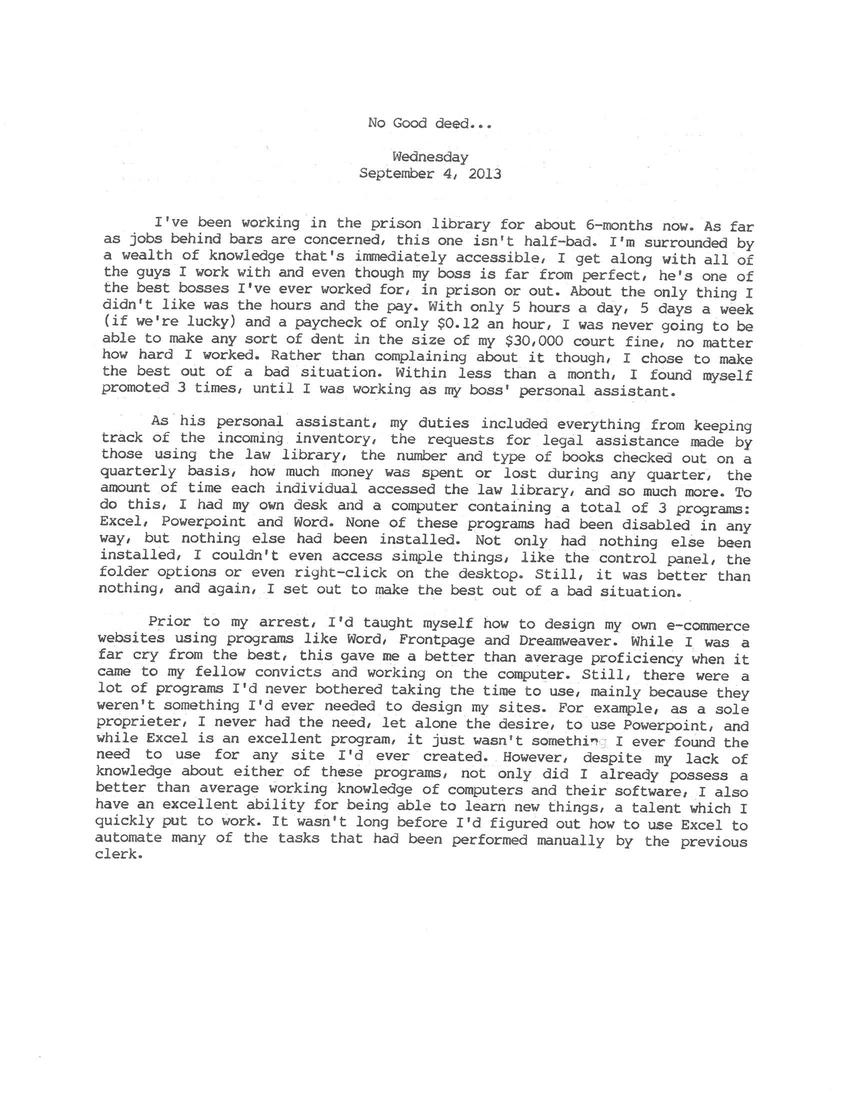
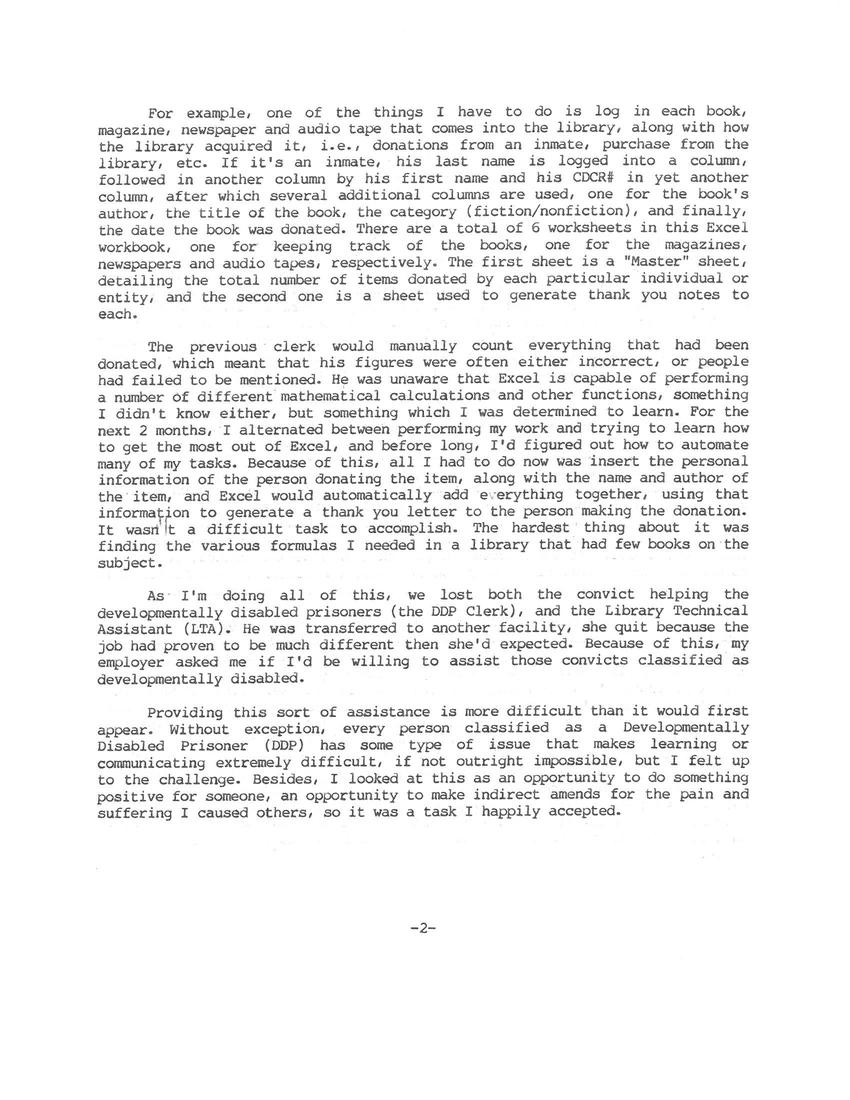
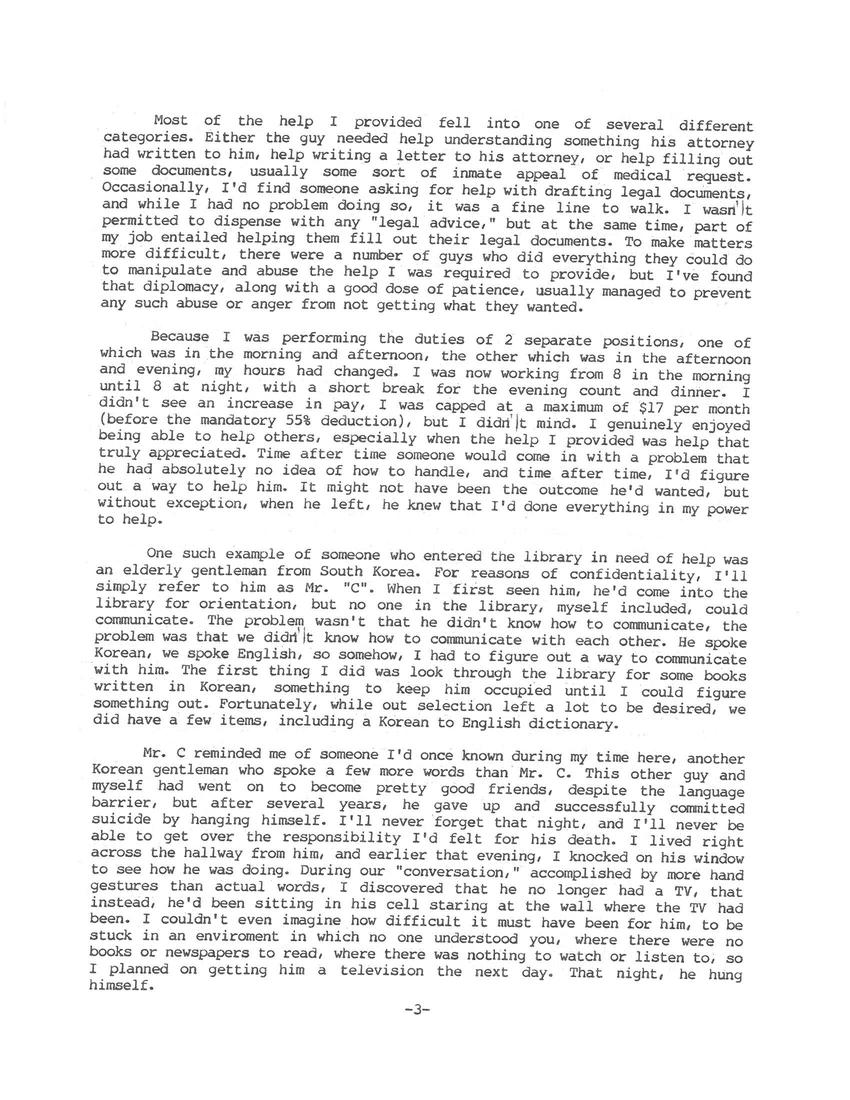
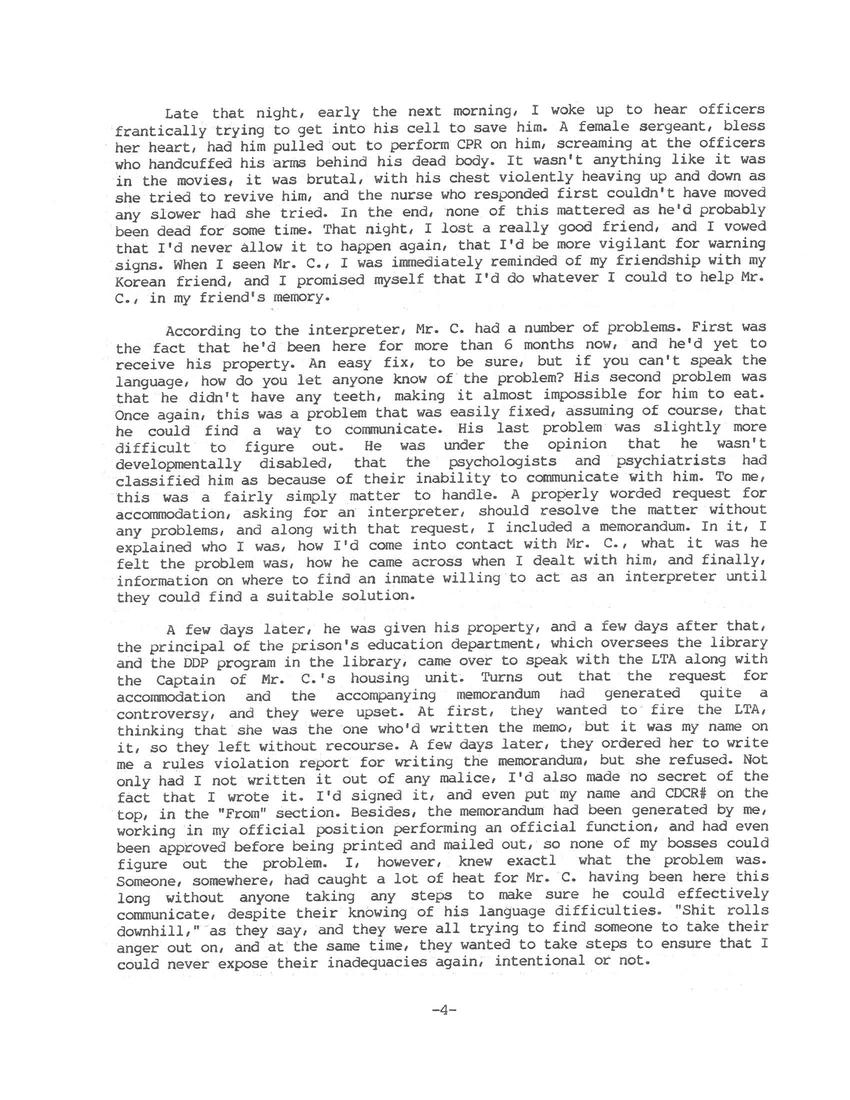
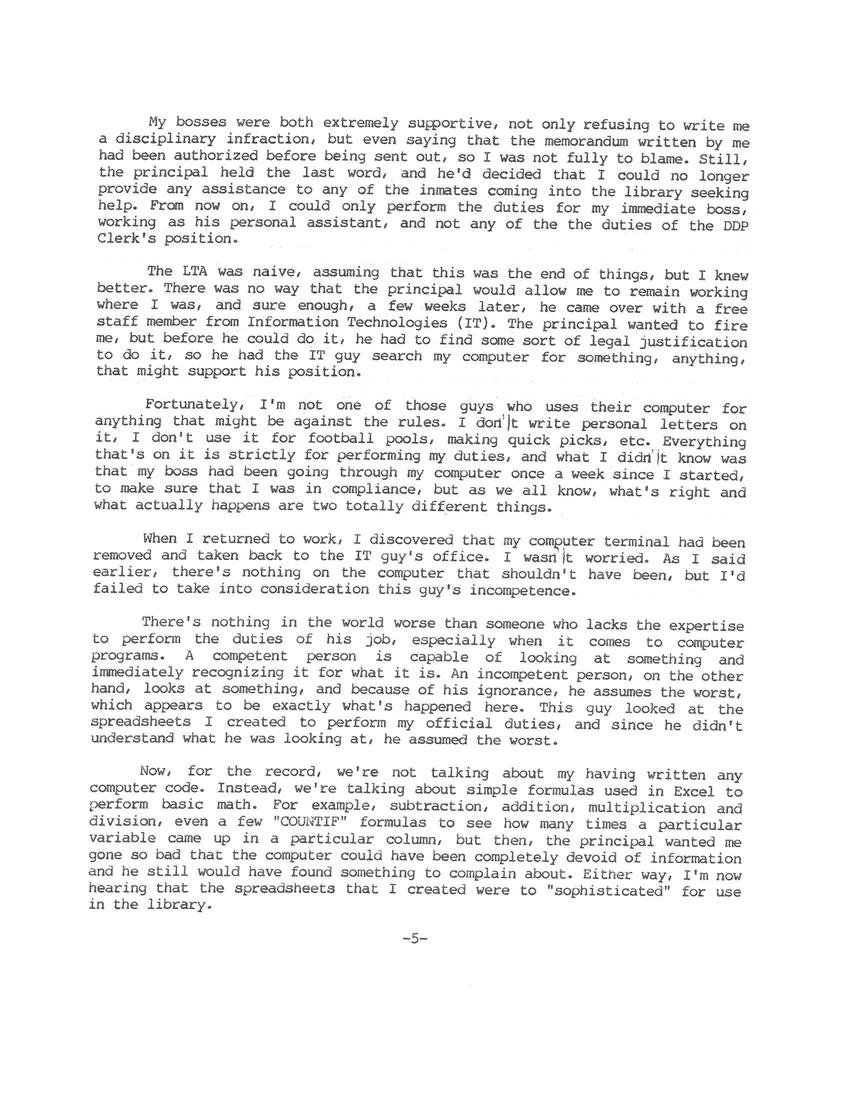
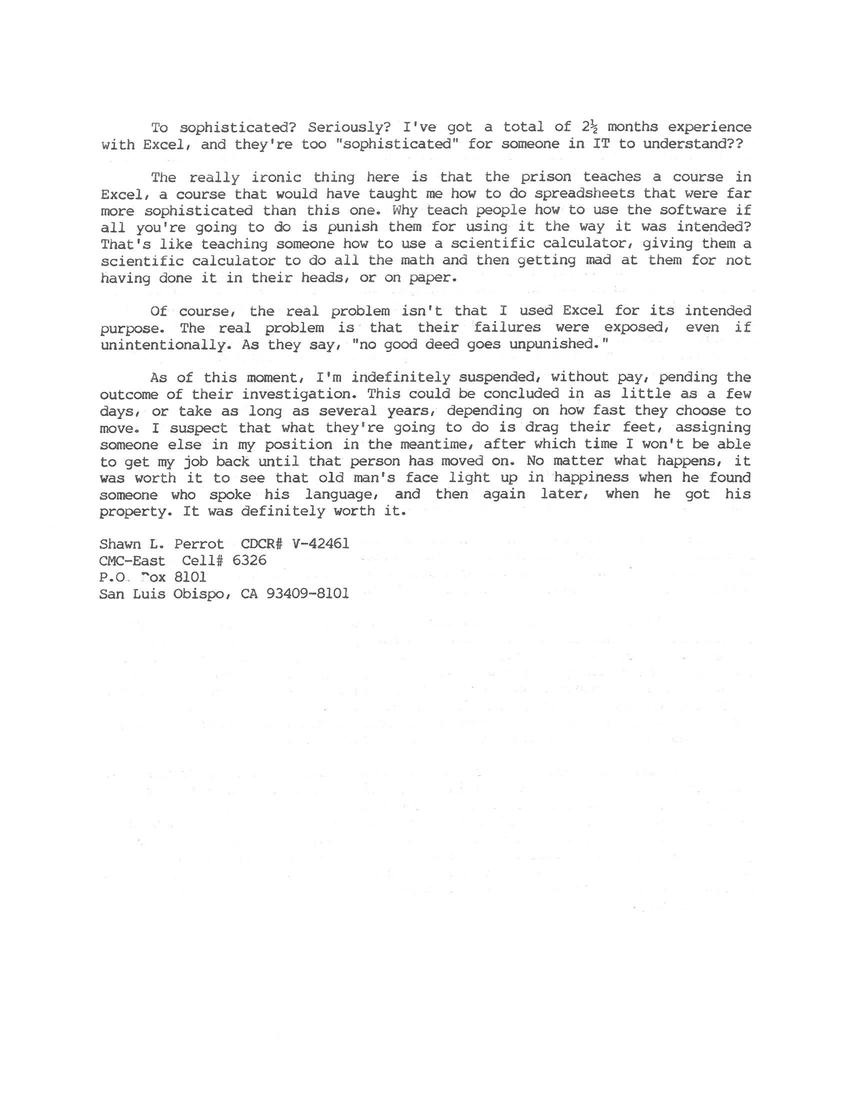

Replies (1)
You've made the best use of available resources. Your star may have shone too brightly. It is good to see you making the most of your mind and heart despite circumstances and consequences.